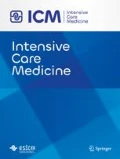Dear Editor,
Critical care nursing (CCN) is an increasingly complex and growing area of specialty practice [1]. Yet access to specialty training and high quality CCN education remains a significant issue for CCN [1], creating role confusion between countries for CCN, impeding mobility across Europe and career progression for the CCN workforce [2].
To overcome similar problems in intensive care medicine (ICM), the CoBaTrICE programme was developed. A competency-based training programme for ICM across Europe [3, 4], this programme has been adopted in 15 European countries and provides a common set of programme standards and ensures ICM is recognised as a primary specialty area for physicians [4].
The purposes of this study were to (i) map adult CCN education programmes; (ii) examine existing educational structures, processes and outcomes; and (iii) identify the barriers to advancing CCN education programmes across Europe, through the use of a descriptive survey of registered nurses in leadership roles within CCN organisations. The survey was completed via telephone, online and in hard copy in order to optimise recruitment.
Twenty-four European countries were represented, and challenges or problems for teaching or training CCN were identified in 22 of these. Formal CCN education programmes were provided in 17 (70 %) of countries (Table 1) and CCN was recognised as a specialty in 13 (54.2 %) of countries. Where education programmes were provided, eligibility requirements and programme duration varied considerably, ranging from 240 h to 24 months, with no consistency in how students were assessed/examined, or qualification awarded. The lack of national standard for teaching and training nurses in intensive care was also a problem identified in 12 (54.5 %) countries, followed by a lack of time for trainers to devote to teaching in 14 (63.6 %) countries, a lack of protection for the title in 10 (45.5 %) countries, limited work hours/shift work impacting teaching and training in the ICU in 9 (40.9 %) countries and a lack of access to educational resources in 6 (27.3 %) countries.
Our results indicate that the first challenge is the recognition of CCN as a specialty area across Europe. The second challenge is the development of a Europe-wide specialist education programme that results in nurses with the knowledge, skills and expertise fit-for-purpose for the increasing patient acuity in critical care [5]. The third challenge is to ensure changes to the nursing workforce across Europe, such as implementing a framework that enables advanced practice roles in CCN to be recognised and regulated, and enable suitably qualified critical care nurses to work freely across country borders.
In conclusion, there are significant barriers impeding the development and advancement of CCN education across Europe. A Europe-wide approach to addressing these is imperative before CCN can advance as an area of specialty practice and meet the increasing needs of the critically ill patient.
References
Williams G et al (2011) Critical care nursing organizations and activities: a third worldwide review. Int Nurs Rev 59:73–80. doi:10.1111/j.1466-7657.2011.00926.x
Dury C et al (2014) Specialist nurse in Europe: education, regulation and role. Int Nurs Rev 61:454–462. doi:10.1111/inr.12123
Barrett H, Bion J (2005) An international survey of training in adult intensive care medicine. Int Care Med 31:553–561. doi:10.1007/s00134-005-2583-7
Bion J, Rothen H (2014) Models for intensive care training: a European perspective. Am J Resp Crit Care Med 189:256–262. doi:10.1164/rccm.201311-2058CP
Labeau S, Chiche J-D, Blot S (2012) Post-registration ICU nurses education: plea for a European curriculum. Int J Nurs Stud 49:127–128. doi:10.1016/j.ijnurstu.2011.07.014
Author information
Authors and Affiliations
Corresponding author
Ethics declarations
Conflicts of interest
None of the authors have conflicts of interest.
Rights and permissions
Open Access This article is distributed under the terms of the Creative Commons Attribution-NonCommercial 4.0 International License (http://creativecommons.org/licenses/by-nc/4.0/), which permits any noncommercial use, distribution, and reproduction in any medium, provided you give appropriate credit to the original author(s) and the source, provide a link to the Creative Commons license, and indicate if changes were made.
About this article
Cite this article
Endacott, R., Jones, C., Bloomer, M.J. et al. The state of critical care nursing education in Europe: an international survey. Intensive Care Med 41, 2237–2240 (2015). https://doi.org/10.1007/s00134-015-4072-y
Accepted:
Published:
Issue Date:
DOI: https://doi.org/10.1007/s00134-015-4072-y

